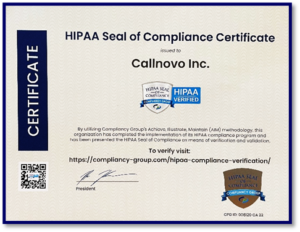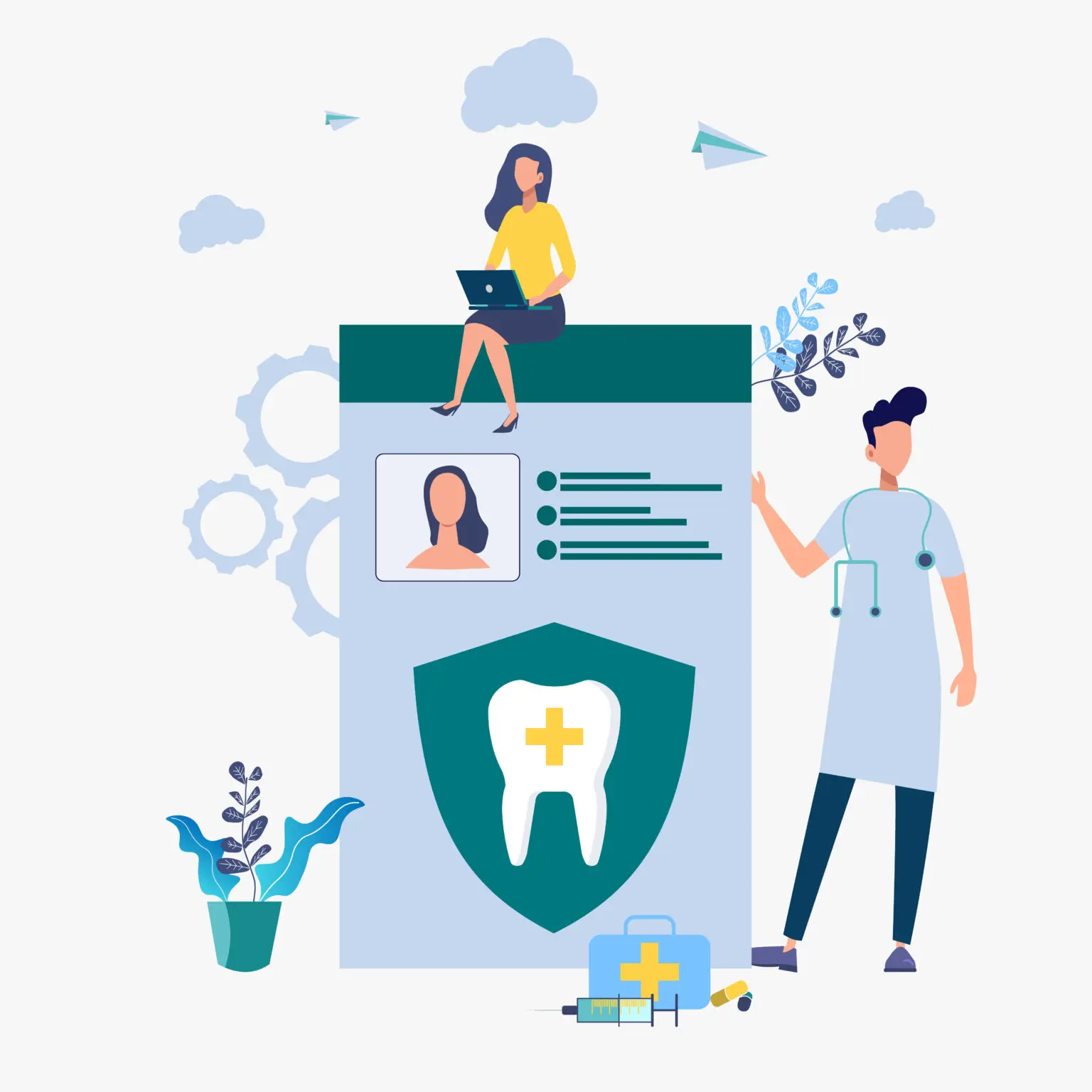Within the healthcare industry, patient data confidentiality and dental office HIPAA compliance is extremely vital. Recently, Callnovo wrote on benefits of HIPAA compliance for healthcare patients whereby it’s mentioned security concerns regarding personal data confidentiality breaches is a real problem, stating:
“within the United States alone, healthcare data breach costs have risen by ~42% since 2020 – accounting for ~US$ 10.10 million dollars as of this month (November 2022); due to healthcare patient data breaches, US$ millions are being spent each year to recover data and/or improve critical healthcare infrastructure – accounting for more than 710 data breaches of 500 or more patient records per breach since 2021 – steadily increasing each year (a 355,000 record bare minimum in total).”
To continue to build & retain patient trust, evading data breaches that’d significantly & negatively affect patients, causing real risk to their lives, it’s highly-important to both have a good understanding of the rules & regulations behind the Health Insurance Portability and Accountability Act (HIPAA) – and know what best practices your business can employ to comply with dental office HIPAA compliance standards & regulations, protecting your patients’ data.
As part 3 and part 4 of our series on HIPAA, we’re going to focus on dental office HIPAA compliance 2022 – part 1 of our latest guide – observing the best dental office HIPAA compliance practices that mitigate risk to healthcare data breaches, ensuring your patients’ healthcare & dental info. is securely-protected. Within, you’ll learn about:
- the 1st 5 dental office HIPAA compliance best practices, and
- how Callnovo Contact Center – a HIPAA-certified call center/contact center – helps bring dental patient data protection to your organization by adhering to dental office HIPAA compliance rules & regulations, giving your patients ease of mind and heart as they look to improve their own quality of life.
Let’s get started.
Part 1: Dental Office HIPAA Compliance Best Practices (BPs)
BP #1: HIPAA Training
Regular HIPAA training ensures all employees are up-to-date on the most recent compliance regulations; most importantly, your team will understand why such regulations exist.
As both the HIPAA Security Rule & Privacy Rule have training requirements in place, let’s go through each:
- HIPAA Privacy Rule’s Training Reqs. – citing training as an administrative requirement (45 CFR § 164.530):
- Regarding training standards, covered entities must provide complete training to all employees on policies & procedures surrounding health data protection.
- Regarding training implementation, covered identities must provide training to each dental office employee that meets the following requirements: (1) new personnel receive complete training by the compliance date for each entity, (2) new personnel receive such training within a reasonable period of time after joining the workforce, (3) if any personnel’s functions are affected by material changes in policies/procedures, complete training covering each change must be provided within a reasonable amount of time of whichever change, and (4) all training must be thoroughly-documented.
- HIPAA Security Rule’s Training Reqs. – citing required training under its administrative safeguard section (45 CFR § 164.308):
- Regarding security awareness/training standards, covered entities must implement a security awareness & training program for each employee.
- Regarding implementation: (1) addressable security reminders must be periodically-provided, detailing security updates, (2) addressable procedures must be implemented for guarding against, detecting, and reporting malicious software, (3) addressable procedures must be implemented for monitoring log-in attempts & reporting discrepancies, and (4) addressable procedures must be implemented for creating, changing, and safeguarding user passwords.
Here’s what your dental office should do:
- Since HIPAA training allows for flexible implementation, have your office consider what’s the best means of implementation that meets HIPAA requirements while ensuring training conveniently-meets your own goals.
- Ensure training is consistent, provided periodically (on a yearly basis), and is always up-to-date and thorough/complete.
BP #2: Utilize Modern, Electronic Formats
Though an antique way of documenting dental patient data, paper documentation creates unnecessary, significant operational risks; here’s some below:
- patients could accidentally/intentionally see other patients’ records left on service desks in common areas,
- records could be lost due to incorrect or a lack of filing,
- improper record disposal could lead to exposure,
- unwanted destruction of records is a risk due to catastrophic events such as office fires,
- records could be delivered to the wrong address, and/or
- others.
By switching to a modern, electronic format, greater patient data security is possible – minimizing/eliminating such risks and others. Furthermore, depending on your encryption level, you could possibly even send emails containing PHI if applicable.
BP #3: Practice Discretion When Sharing Data
As previously-alluded to, partnered organizations are classified by HIPAA as “business associates.” It’s important to sign a business associate agreement (BAA) with each business partner, ensuring you – and your partners – handle PHI in a HIPAA-compliant manner; without an agreement, if you or your business associates would violate HIPAA, both entities would be held accountable. If an entity you partner with or are considering partnering with would not want to enter into a BAA, then you should practice discretion, considering passing on the partnership; the last thing needed is a breach notification from a business partner stating they exposed sensitive patient data. You’d need much grace when explaining that to your patients.
BP #4: Understand the Auditing Process
As a result of the Office of Civil Rights’ (OCR) fair transparency regarding the HIPAA auditing process – broken down into 2 phases based on mandated audit rounds taking place from 2016-2017 – we have a clear understanding of how to process audits based on HIPAA regulation. Let’s go through such phases below.
OCR Audit Phase 1: Desk
The 1st involved various desk audits processed on covered entities & business associates; these audits observed compliance of requirements based on specific Privacy, Security, and Breach Notification Rules. As such, covered entities/business associates were required to provide documentation proving HIPAA compliance with the requirements provided to the OCR.
OCR Audit Phase 2: Onsite
The 2nd involved onsite visits of OCR auditors; during visits, auditors reviewed documentation, sharing their findings with such visited entities. Once reviewed, auditors then created a full report describing methods used & findings discussed.
BP #5: Have Proper Documentation of What’s Needed
If you’re ever audited, the standard procedure is you’ll have maximum 10 days to submit all documentation to the OCR proving HIPAA compliance. Documentation you may need to provide includes:
- results of security risk assessments,
- Security, Privacy, and Breach Notification policies/procedures,
- notice & acknowledgement of privacy practices,
- proof of training (completion certifications, grades, etc.),
- explanation & proof of sanctions imposed on employees for noncompliance,
- digital & physical breach notification letters,
- authorization forms,
- documentation of complaints, and
- others.
While your business may think this isn’t difficult, HIPAA has a data retention requirement which is more involved; according to 45 CFR § 164.316 (b)(2)(i), it’s required you retain all documentation for 6 years from either the documented date or the date when it was last in effect – whichever is later. We recommend you stay ahead of the majority of dental offices that don’t meet such requirements by being proactive in compliance; create such documentation if you haven’t – and ensure they’re on hand.
Part 2: Dental Office HIPAA Compliance Best Practices (BPs)
Next week, we’ll look at part 2 of best practices surrounding dental office HIPAA Compliance 2022; we’ll cover such best practices as:
- how to properly run a risk analysis,
- how to implement an effective, efficient, and thorough incident response plan,
- the importance of proactiveness in answering a pre-screening questionnaire,
- how to conduct a proper practice audit, and
- how to keep calm so your dental office can ensure it handles HIPAA compliance properly, leading to evasion of hefty fines and also encouraging strong patient data security and confidentiality.
Callnovo Contact Center – a HIPAA-certified Call Center

Callnovo Contact Center – an 18+ year tenure outsourcing expert, with experience in 40+ industries, providing superb outsourcing solutions to close to 1,500 global corporations & Fortune 500 companies – guarantees businesses/organizations within the healthcare industry can securely store and maintain as confidential patient data throughout the lifecycle of such data so healthcare patients can remain at ease, knowing their data is safe. As a HIPAA-certified call center, Callnovo intricately-monitors the handling of healthcare patient data to ensure there’s no data leakage nor risk of data breaches.
Following HIPAA’s rules & regulations, Callnovo:
- upholds HIPAA’s privacy rules by ensuring patients’ data is properly-protected while allowing the data required for the provision & promotion of top-quality health care to flow smoothly, protecting public/private health & patients’ well-being,
- works closely/continually with healthcare providers, healthcare clearinghouses, and business associates acting on behalf of covered entities – including claims processing, data analysis, utilization review, and billing – to ensure all patient data is safely secured, only accessible by authorized personnel so as to maintain patient data confidentiality while ensuring the best healthcare support, and
- vigorously-protects identifiable health info. transmitted/maintained in every form (electronic, oral, or written) by covered entities/business associates (excluding certain educational/employment records).
As a global, omnichannel, multilingual outsourcing leader with a strong reputation, Callnovo likewise upholds the General Data Protection Regulation (GDPR) to ensure European customers’ personal data is kept confidential, ensuring they receive the quality service they need while providing peace of mind and ease of heart.
With Callnovo, your business within the healthcare industry can enjoy additional key advantages – such as:
- High-quality Expertise – quality service personnel skilled in areas as:
- customer-centric enthusiasm/service attitude,
- strong communication skills,
- customer service soft-skills,
- intuitive logical thinking skills,
- complex product/service knowledge, and
- acute management/operations skills.
- Always-available Service – maximizing customer satisfaction/CX by continually-meeting customers’ needs without limits.
- Omnichannel Support – accessible, rapid, always-ready support through all channels, leading to enhanced CX, influencing long-term brand ambassadorship/loyalty.
- Native Language Support – meeting customers’ needs efficiently, conforming to cultural expectations, improving customer loyalty.
Conclusion
With rising cases of data confidentiality breaches, it’s direly-important for your dental practice to ensure your patients’ dental records & data are kept safe. As such, the Health Insurance Portability and Accountability Act and your compliance functions as a safe haven for patients’ sensitive health info., protecting it from unauthorized, unlawful disclosure. To carefully comply with HIPAA and ensure patient data is safely-protected, we encourage you to put into practice the above-mentioned dental office HIPAA compliance best practices so you can ensure all dental patients’ data is kept safe and that your patients can put at ease, knowing that their personal data isn’t being provided into the wrong hands. Likewise, please consider partnering with a HIPAA-certified call center – such as Callnovo Contact Center – to ensure patients receive superb care – and will fully trust your business to keep their data secure, minimizing the risk that such data would be breached/released without their consent.

